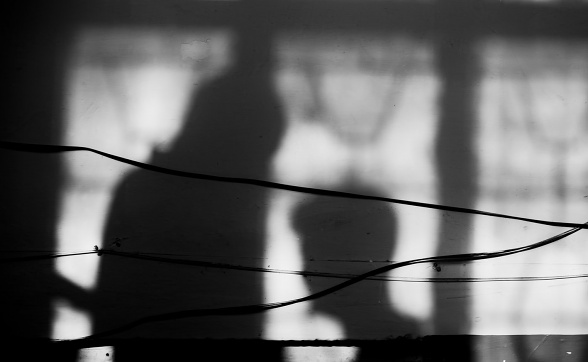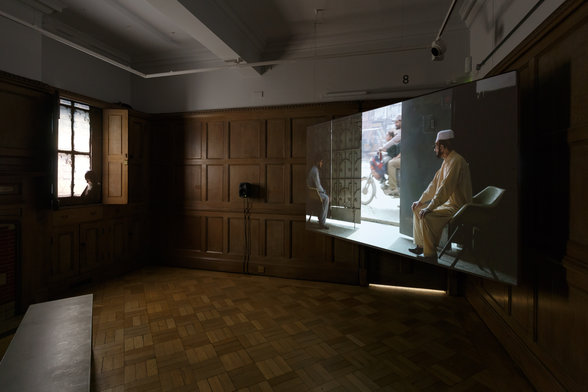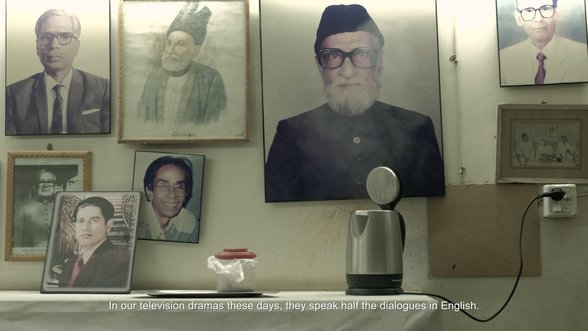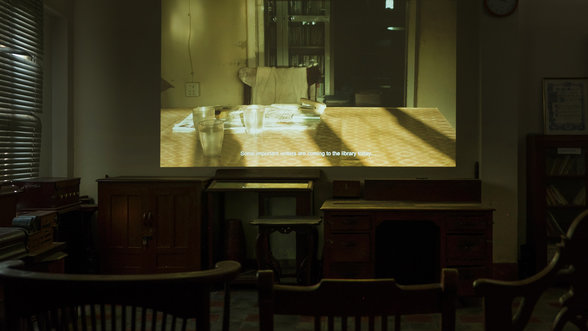Madiha Aijaz on the Future of Libraries
Posted on 29 March 2018 by Liverpool Biennial

Madiha Aijaz, These Silences Are All The Words (film still), 2017-2018. Image courtesy the artist
Madiha Aijaz, These Silences Are All The Words (film still), 2017-2018. Image courtesy the artist
Through the use of photographs, film and fiction, Madiha Aijaz's work explores spaces and communities that have become peripheral to civic life. The artist has been commissioned by Liverpool Biennial, Karachi Biennale and The Tetley to create a new video work, These Silences Are All The Words, which explores her interest in the public libraries of her hometown of Karachi in Pakistan. We spoke to Aijaz to uncover the story behind the work.
I find the connection between colonial cities and post-colonial spaces, and the shared histories between the cities of the Indian subcontinent, very interesting. I like conversations, and I like histories of people. I think that’s where most of my work stems from – conversation and connections on a personal level.
In my current work, I’m looking at how we understand entertainment and what do we mean by it. What are the ways that people entertain themselves? What do public spaces, such as libraries, offer to people now that we’re spending increasing amounts of time on digital platforms?
It’s interesting that there is still a dedicated community of people – almost like a last generation – that still use libraries despite the fact that these spaces have become increasingly run down or started to close. In some ways, I think there’s an element of class division. When you’re in a certain circle and you don’t step out of that, you don’t end up seeing other things.

Madiha Aijaz, These Silences Are All The Words, 2017-2018. Installation view at Karachi Bienniale, 2017. Image courtesy the artist and The Tetley. Photo: Jules Lister

Madiha Aijaz, These Silences Are All The Words (film still), 2017-2018. Image courtesy the artist

Madiha Aijaz, These Silences Are All The Words, 2017-2018. Installation view at Karachi Biennale 2017. Image courtesy the artist and The Tetley. Photo: Jules Lister
People are still interested in things like ancient languages. People in the future could look at things differently to how we do now. They might not spend as much time in the library – just come and speak to the librarian, get some books and leave – but they’re still accessing it. There may not be big events like the readings that used to happen, but people will still come. It’s hard to predict what will happen in the future because things change so fast. Perhaps libraries will cease to exist when this generation leaves.
"It’s hard to predict what will happen in the future because things change so fast. Perhaps libraries will cease to exist when this generation leaves."
There’s an element of futility here which is often at the centre of my work: who is protecting or guarding these books? People don’t know about or get access to rare books which are not digitised. You don’t know what exists where, you can only go and ask the custodian, who can choose whether or not to tell you or give you access.
It’s just about power and control.
Madiha Aijaz is one of the participating artists for Liverpool Biennial 2018: Beautiful world, where are you? which runs from 14 July – 28 October. Her work will be presented at Open Eye Gallery, one of the UK's leading photography spaces.
These Silences Are All The Words is commissioned by Liverpool Biennial, Karachi Biennale and The Tetley, as part of the New North and South, in collaboration with Hospitalfield and ROSL Arts.
Liverpool Biennial
55 New Bird Street
Liverpool L1 0BW
- T +44 (0)151 709 7444
- info@biennial.com
Liverpool Biennial is funded by
Founding Supporter
James Moores